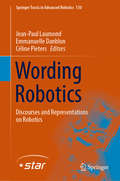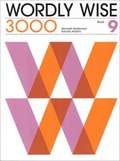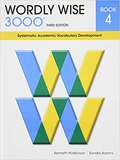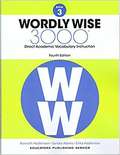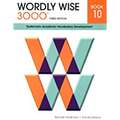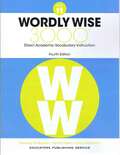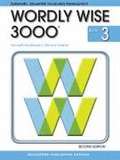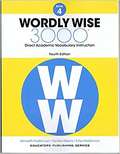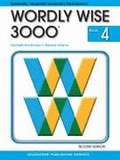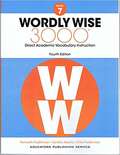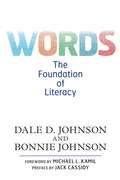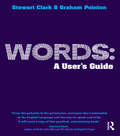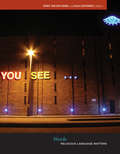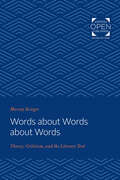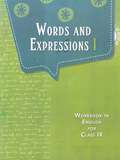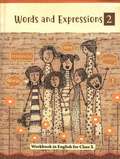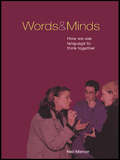- Table View
- List View
Wording Robotics: Discourses and Representations on Robotics (Springer Tracts in Advanced Robotics #130)
by Jean-Paul Laumond Emmanuelle Danblon Céline PietersRobots challenge humans’ beliefs and expectations. Hence, regardless of whether they are the audience of a conference, the visitors of a lab, the citizens in general, some journalists, or the European Parliament, the first step in order to gain a better understanding of the field of robotics is obviously to consult the experts. Roboticists seem indeed to be in the best position to guide society in this matter, whether it is in the everyday life or within an official institution. Today however, there is a gap between the robots, as they are actually thought and built, and the intelligent and autonomous machines, as they are perceived by the society. How can we explain it? Do the words borrowed from the living organisms and used to describe robots play a role in the confusion about the status of the discipline of robotics? The texts gathered within this book focus on the problematic of wording robotics from various perspectives. They are the results of a unique interdisciplinary meeting gathering roboticists, linguists, philosophers and neuroscientists, the 4th Workshop of Anthropomorphic Motion Factory held at LAAS-CNRS in Toulouse on Nov 31st - Dec 1st 2017.
Wordly Wise 3000: Book 9 (Wordly Wise 3000 Ser.)
by Kenneth Hodkinson Sandra AdamsIn Wordly Wise 3000 Book 9, each 15-word lesson begins with an alphabetized Word List that gives pronunciations, parts of speech, and concise definitions, and uses each word in a sentence.
Wordly Wise 3000: Systematic Academic Vocabulary Development
by Kenneth Hodkinson Sandra AdamsWordly Wise 3000: Grade 1, Book 4
Wordly Wise 3000®: Direct Academic Vocabulary Instruction
by Kenneth Hodkinson Sandra Adams Erika HodkinsonThis book helps learn words directly. The learners are reading the words, learning what they mean, studying them and practicing them as they do the activities. Finally, they might even use them in their own writing or conversations. This book is designed to teach words that the students need to do well in school and will also help them learn more words.
Wordly Wise 3000: Direct Academic Vocabulary Instruction (Fourth Edition) (Medieval Mysteries #3)
by Kenneth Hodkinson Sandra Adams Erika HodkinsonWordly Wise 3000 can't teach you all the words you'll need, but it will help you learn lots of them. It can also help you learn how to learn even more words.
Wordly Wise 3000 Book 10: Systematic Academic Vocabulary Development
by Kenneth Hodkinson Sandra Adams<P>Obviously, it's important to know what words mean.<P> Your studies so far in school have proven that time and time again. <P>We might be tempted to skip words we don't know--particularly difficult words--when we see them in textbooks.<P> But this affects how well we understand what we read.
Wordly Wise 3000 Book 3 [Workbook]
by Kenneth Hodkinson Sandra AdamsWords from literature, textbooks, and the SAT--words most likely to appear on high-stakes tests. Student books include 150 words per level in books 2-3 and 300 new words per level in books 4-12.
Wordly Wise 3000 Book 4
by Kenneth Hodkinson Sandra Adams Erika Hodkinson<p>You've been learning words since you were a tiny baby. At first, you learned them only by hearing other people talk. Now that you are a reader, you have another way to learn words. Obviously, it's important to know what words mean, but lots of times, we think we can get away without knowing some of them as we read. This could cause a problem. Say you are reading the directions for a new game. You know most of the words in the sentence you're reading. Then you stop for a word you don't recognize: Please do not touch the blegmy or your score will be lost. You ask yourself, "What is a blegmy?" At first you think, "Well, it's only one word." But then you think, "What is it that I'm not supposed to touch?" All of a sudden, knowing what that one word means is important! <p>Clearly, the more words you know, the better your understanding of everything you read. Wordly Wise 3000 will help you learn a lot of words, but it can't teach you all the words you'll ever need. It can, however, help guide your learning of new words on your own.</p>
Wordly Wise 3000 Book 4 [Workbook]
by Kenneth Hodkinson Sandra AdamsWords from literature, textbooks, and the SAT--words most likely to appear on high-stakes tests. Student books include 150 words per level in books 2-3 and 300 new words per level in books 4-12.
Wordly Wise 3000 Direct Academic Vocabulary Instruction Book 5 (Fourth Edition)
by Kenneth Hodkinson Sandra Adams Erika HodkinsonWordly Wise 3000, 4th Edition, Book 5 contains 20 lessons with 15 words per lesson and focuses on preparing students to be able to decipher words they'll encounter in content area texts, literature, and tests. Lessons begin with word lists that include definitions with contextual sentences, much like dictionary entries; a selection of activities follow the word list, which may include matching words and definitions, matching synonyms and antonyms, identifying whether words were used correctly in a particular context, sentence completions, reading passages followed by comprehension questions, discussion/writing extension ideas, and other exercises.
Wordly Wise 3000 Direct Academic Vocabulary Instruction Book 6 (Fourth Edition)
by Kenneth Hodkinson Sandra Adams Erika HodkinsonBuild vocabulary along with reading, writing, and critical thinking skills with Wordly Wise 3000! Wordly Wise 3000, 4th Edition, Book 6 contains 20 lessons with 15 words per lesson and focuses on preparing students to be able to decipher words they'll encounter in content area texts, literature, and tests. Lessons begin with word lists that include definitions with contextual sentences, much like dictionary entries; a selection of activities follow the word list, which may include matching words and definitions, matching synonyms and antonyms, identifying whether words were used correctly in a particular context, sentence completions, reading passages followed by comprehension questions, discussion/writing extension ideas, and other exercises .
Wordly Wise 3000 Direct Academic Vocabulary Instruction Book 8 (Fourth Edition)
by Kenneth Hodkinson Sandra Adams Erika HodkinsonWordly Wise 3000, 4th Edition, Book 8 contains 20 lessons with 15 words per lesson and focuses on preparing students to be able to decipher words they'll encounter in content area texts, literature, and tests. Lessons begin with word lists that include definitions with contextual sentences, much like dictionary entries; a selection of activities follow the word list, which include replacing a phrase with a word from the list that means the same thing, identifying the correct definition, choosing the best word to complete a sentence, identifying synonyms, reading passages followed by comprehension questions, discussion/writing extension ideas, and other exercises.
Wordly Wise 3000 Grade 3 Student Book: 2nd Edition (Wordly Wise 3000 Ser. #3)
by Kenneth Hodkinson Sandra AdamsWORDLY WISE 3000 SECOND EDITION BOOK 3
Wordly Wise 3000, Grade 7: Direct Academic Vocabulary Instruction (Fourth Edition)
by Kenneth Hodkinson Sandra Adams Erika HodkinsonThe more words you know, the better your understanding of everything you read. Wordly Wise 3000 will help you learn a lot of words, but it can't teach you all the words you'll ever need. It can, however, help guide your learning of new words on your own.
Wordly Wise, Grade K
by Cheryl DressierWordly Wise 3000 Level K develops key oral vocabulary that lays the foundation for literacy success and prepares students for the content area reading they will encounter in later grades. Vibrant illustrations motivate children and keep them focused while reinforcing key vocabulary words and concepts through a variety of teacher-led activities.
Words
by Bonnie Johnson Dale D. JohnsonWritten by respected authorities in the fields of education and literacy studies, Words: The Foundation of Literacy is a groundbreaking book for teachers, administrators, and education students. Dale and Bonnie Johnson present a fresh, inspiring reminder of why studying language--from word origins to word structure--is such a vital first step in the development of students' vocabulary, literacy, writing skills, and overall ability to learn. At a time when high-stakes testing has squeezed substance from many curricula, Johnson and Johnson provide ways to enhance students' understanding, interest, and appreciation of language and all its subtleties. Words explores how meaning in language is created by the use and interrelationships of words, phrases, and sentences, their denotations, connotations, implications, and ambiguities. From birth, most children exhibit a natural interest in language--its sounds, nuances, and unpredictable qualities. It is important to sustain, stimulate, and recapture that natural interest in the classroom, and Words provides a multitude of creative and practical techniques for doing so.
Words
by Dale D. Johnson Bonnie JohnsonWritten by respected authorities in the fields of education and literacy studies, Words: The Foundation of Literacy is a groundbreaking book for teachers, administrators, and education students. Dale and Bonnie Johnson present a fresh, inspiring reminder of why studying language--from word origins to word structure --is such a vital first step in the development of students’ vocabulary, literacy, writing skills, and overall ability to learn. At a time when high-stakes testing has squeezed substance from many curricula, Johnson and Johnson provide ways to enhance students’ understanding, interest, and appreciation of language and all its subtleties. Words explores how meaning in language is created by the use and interrelationships of words, phrases, and sentences, their denotations, connotations, implications, and ambiguities. From birth, most children exhibit a natural interest in language--its sounds, nuances, and unpredictable qualities. It is important to sustain, stimulate, and recapture that natural interest in the classroom, and Words provides a multitude of creative and practical techniques for doing so.
Words
by Dale D. Johnson Bonnie JohnsonWritten by respected authorities in the fields of education and literacy studies,Words: The Foundation of Literacyis a groundbreaking book for teachers, administrators, and education students. Dale and Bonnie Johnson present a fresh, inspiring reminder of why studying language—from word origins to word structure—is such a vital first step in the development of students’ vocabulary, literacy, writing skills, and overall ability to learn. At a time when high-stakes testing has squeezed substance from many curricula, Johnson and Johnson provide ways to enhance students’ understanding, interest, and appreciation of language and all its subtleties. Wordsexplores how meaning in language is created by the use and interrelationships of words, phrases, and sentences, their denotations, connotations, implications, and ambiguities. From birth, most children exhibit a natural interest in language—its sounds, nuances, and unpredictable qualities. It is important to sustain, stimulate, and recapture that natural interest in the classroom, andWordsprovides a multitude of creative and practical techniques for doing so.
Words: A User's Guide
by Graham Pointon Stewart ClarkWords: A User's Guide is an accessible and invaluable reference that is ideal for students, business people and advanced learners of English. The book is structured in groups of words that may be confused because they sound alike, look alike or seem to have similar meanings, and this approach makes it much more intuitive and easy to use than a dictionary. Contrasting over 5000 words (such as habitable and inhabitable, precipitation and rainfall, reigns and reins), Words: a User’s Guide provides examples of usage adapted from large national databases of contemporary English, and illustrates each headword in typical contexts and phrases. This book gives you straightforward answers, and helps with pronunciation, spelling, style and levels of formality. For those working internationally it presents international standards and compares usage in Britain and the USA. Words: A User’s Guide is an excellent resource for anyone who wants to communicate well in written and spoken English. "At last! A book about the use of words that clarifies and de-mystifies in an eminently usable way. I would recommend it to anyone who wants to write well. It is a book to keep." Sandy Gilkes, Head of the Centre for Academic Practice, University of Northampton "Rigorous, fresh, intriguing and downright useful, it deserves a place on every properly stocked reference shelf." Brian Cathcart, Professor of Journalism, Kingston University "From the pedantic to the permissive, everyone who’s interested in the English language and the way we speak and write it will want a copy of this practical, entertaining book." Wynford Hicks (author of Quite Literally and The Basics of English Usage)
Words: Religious Language Matters (The Future of the Religious Past)
by Asja Szafraniec Ernst van den HemelIt is said that words are like people: One can encounter them daily yet never come to know their true selves. This volume examines what words are—how they exist—in religious phenomena. Going beyond the common idea that language merely describes states of mind, beliefs, and intentions, the book looks at words in their performative and material specificity. The contributions in the volume develop the insight that our implicit assumptions about what language does guide the way we understand and experience religious phenomena. They also explore the possibility that insights about the particular status of religious utterances may in turn influence the way we think about words in our language.
Words about Words about Words: Theory, Criticism, and the Literary Text
by Murray KriegerOriginally published in 1987. In Words about Words about Words, Murray Krieger advances his ongoing dialogue with the rich diversity of contemporary literary theory and elaborates on his own position as it grows out of an opposing relation to much of current criticism. Krieger examines the kinds of ideologies and ontologies smuggled into literary theory that purports to be anti-ideological and anti-ontological. He explores the extent to which critical fashions dictate the development of theory and the reasons why particular theories exclude certain kinds of literary works in favor of others. Under such circumstances, Krieger asks, What becomes of the critic's task of evaluation? Further, what is the relation of the idea of progress to criticism and the arts, and what is the effect of these notions on cultural and intellectual institutions? He seeks an alternative to the deterministic tendencies of the new historicism in viewing the relations of literature and literary criticism to society. Progressing from broad questions to more focused critical problems and close readings, Krieger reviews the aesthetic tradition as it has evolved from Kant. He engages in debate with deconstructionist critics about the role of symbol and allegory as descriptions of ways in which poems succeed or fail in constructing their verbal universe. And he argues that, for all its brilliance, deconstruction has not yet been able to fulfill the social or academic functions of the older, aesthetic-based disciplines that it set out to deconstruct.
Words and Expressions-1 class 9 - NCERT - 23
by National Council of Educational Research and Training"Words and Expressions 1" is an essential textbook for Class 9 students by NCERT, designed to enhance their language skills and literary understanding. Through a diverse selection of poems, prose, and supplementary texts, the book aims to cultivate a deep appreciation for language and literature. Each chapter is meticulously curated to cover a wide range of themes, from nature and human emotions to social issues and cultural diversity. Through engaging activities and exercises, students are encouraged to explore language nuances, expand their vocabulary, and refine their writing skills. The textbook also emphasizes critical thinking and analysis, prompting students to interpret texts, express their opinions, and engage in meaningful discussions. With its comprehensive approach and interactive learning techniques, "Words and Expressions 1" serves as a cornerstone for students' linguistic and literary development, laying the groundwork for effective communication and lifelong learning.
Words and Expressions-2 class 10 - NCERT - 23
by National Council of Educational Research and TrainingWords and Expressions 2, an English workbook for Class 10 students, aims to enhance vocabulary, grammar, and writing proficiency. The workbook offers a variety of exercises, including vocabulary drills, grammar practice, and writing assignments, catering to essay, letter, and creative writing genres. Additionally, it incorporates reading passages with comprehension questions to foster reading comprehension skills. This comprehensive resource serves as a valuable tool for Class 10 students seeking to elevate their English language abilities.
Words and Minds: How We Use Language to Think Together
by Neil MercerWords and Minds takes a lively and accessible look at how we use language to combine our mental resources and get things done. Examining everyday language and drawing on a wide range of research, but always with a light style, Neil Mercer provides a unified account of the relationship between thought and language.Mercer analyses real-life examples of language being used effectively, or otherwise, in many different settings, including workplaces and schools, the home, the internet and the courtroom, and offers practical insights into how we might improve our communication skills.Words and Minds will appeal to anyone interested in language and the psychology of everyday life.
